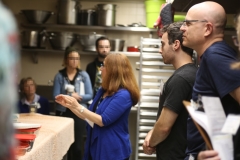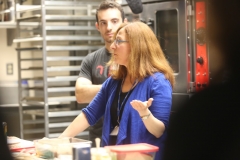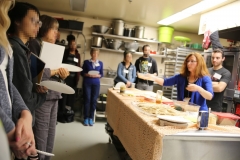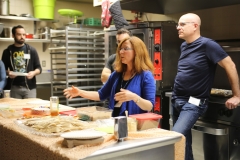
SCD and other highlights from the CCFA NW event
The Seattle CCFA NW educational conference, held this past weekend, provided an opportunity to meet and chat with other people who are using diet therapies.

My chat with Dr. Suskind before he headed to the stage was interesting as always. 
One of my personal highlights was when Dr. Suskind took a moment to introduce me to a researcher who suffers from IBD and has a personal interest in microbiome and diet therapy. It turned out that this PhD. research scientist started SCD eight months ago, after reading our family’s SCD story here on Gut Harmony, and is now doing well.
Presentation slides from the event were promptly shared online with those who could not attend in person. I received feedback from parents in the online group SCD Families that could not attend and relied on the slides only, some of whom were disappointed with the lack of details and relatively shallower content depth of the slides. However, I must say that we are ‘intellectually spoiled’ in our group. We have many science oriented parents that are highly educated and extremely motivated. It is evident that many of us could benefit from a separate conference dedicated to advanced aspects of diet therapies. I believe this will be an option in the future.
It is important to remember the context of these presentations. An educational CCFA event is geared to “the general public” and the presenters are expected to deliver content at a level that will be inclusive to all attendees. The slides are only part of the presentation, and a lot of added value is generated in the audience Q&A sessions and in the informal chats that are not recorded.
In any case, this was an important event with several good outcomes:
- Many participants that did not know about diet therapies left the event better informed. Most doctors do not raise diet therapy as an option at all, so this was an opportunity to raise awareness and educate new patients.
- The doctors that delivered the presentations could easily detect a high level of interest in diets – as many questions from the audience were diet related. The feedback from patients to doctors is no less important in these kind of events. Doctors do take notes and pay attention to the high level of interest in nutritional therapies. It was noted by the panel that many more GI doctors are applying for research grants on diet related topics. The challenge is in receiving funding for such research.
- I asked the panel: what would it take to get adult GI doctors to accept and use diet therapies as part of their IBD tool box. The answer was that they will need to see more formal research that proves the efficacy of nutritional therapy.
Here are the links for the presentation slides:
- The Role of Diet – David Suskind, MD – Seattle Children’s
- Evolution of Crohn’s & Colitis – Elisa Boden, MD – Virginia Mason
- Back to the Basics: What is IBD? – Karlee Ausk, MD – Swedish
- Overview of Medications – James Lord, MD, PhD – Benaroya Research Institute
- Role of Surgery– Alessandro Fichera, MD – University of Washington
- Health Maintenance & Self Advocacy – Lindsay Masters, BSN, RN – Northwest Gastroenterology Associates
As part of the conference I had an opportunity to create and present a short hour of ‘taste and chat’ about SCD and Paleo AIP foods. There was an interesting mix of participants in my presentation, some very experienced SCD dieters and some complete novices who just learned about diet therapy for the first time. I prepared foods in advance and we all tasted easy-to-make treats: Red lentil crackers and tahini dip, followed by lemon gummies which are loved by SCD kids and are suitable even during colonoscopy prep, and we ended with a honey-spice cake topped with warm berries.
As a bonus, my friend Erica Kerwien author of Cooking for the Specific Carbohydrate Diet joined us, and brought two copies of her book, which were gifted to two participants who are new to SCD.
I also had an opportunity to brag about two food companies that were “conceived in-house” in the support group I mentor. Showcasing the attractive packages of Liberated Specialty Foods and of Caleb’s Cooking Company was gratifying, as I talked about my favorite foods and treats that cater to SCD and similar diet therapies.

Additional important notes that the physicians panel agreed upon

- Many GI doctors that currently do not recommend nutritional therapies would support and advocate for diet therapies for patients only after additional research confirms the efficacy of such diets.
- Diet is notoriously difficult to research, and there are limited funding resources for this kind of study. It would be naïve to expect pharmaceutical companies to invest money where they do not see a potential return on investment. This means that diet studies have a dependency on funding from public sources like the NIH and organizations like the CCFA.
- To date, there are no reliable tools that can help doctors predict which medication or which diets will be ideal for each patient. Treatment decisions are often based on the accumulated experiences of individual physicians, and patients feel like their treatment path is prescribed by trial and error. The future of medicine lies in the ability to personalize and tailor all medical treatments, including diets and medications to the individual patient.
Photos courtesy of Lydia Ely




Tali thank you so much. These are powerful insights. Thank you for putting it all in one place. Wish we could have been there for the tasting portion as well!